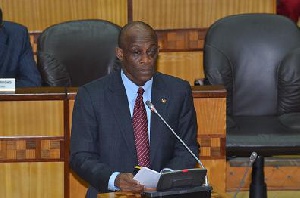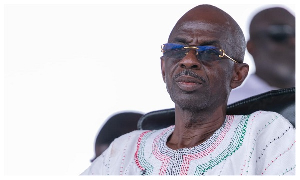The mid-year revised budget did the opposite of what was expected, and the government missed a big opportunity to show it is ready to take the hard decisions necessary to rescue the economy from its present malaise, Kwame Pianim, the economist and former government technocrat in the 1970s, has said.
Speaking at a forum convened by the Bank of Ghana (BoG) to discuss ways to boost foreign exchange inflows to stem the chronic depreciation of the cedi, Mr. Pianim, who chaired the forum, strongly criticised July’s budget review – arguing that rather than announce expenditure cuts, the government used the opportunity to boost spending and seek approval to borrow an additional GH¢.1.16billion.
“Ghana is facing a major economic crisis – one not seen since the dark days of the 1980s. There’s a denial, however, in public pronouncements of the magnitude of the problem that we face… One would have expected the [mid-year] review to come out with budgetary cuts instead of committing additional resources to expenditure. Advantage was also not taken to send a strong signal that we need to tighten our belts,” he said.
The mid-year budget review, necessitated by the severe shocks the economy experienced in the first half of the year, was one of the key recommendations of the national economic forum held in Senchi in May.
Mr. Pianim was one of the prominent dignitaries invited to the forum to offer views on how to tackle the economy’s challenges.
Seth Terkper, the Minister of Finance, presented the review and supplementary budget to Parliament on July 16, where he announced that government expenditure has had to be increased – from GH¢35billion to GH¢36.4billion – to accommodate extra spending on energy subsidies, interest, wages and capital investments.
He also revised the budget gap to a new estimate of 8.8 percent of GDP from 8.5 percent previously. Mr. Pianim however thinks the government’s finances are in a situation that is too dire to permit more spending and borrowing.
“Time is running out for a peaceful, orderly and democratic transformation of the economy,” he said at the forum on Tuesday. “We need to get a handle on growing structural imbalances and restore policy credibility, which has sunk to a historic low.”
The Bank of Ghana and the Ministries of Trade and Finance have invited academics, bankers, industrialists and leading export bodies to the forum that enters its second day today to solicit ideas on how to increase the country’s foreign exchange earnings and diversify exports.
Mr. Pianim warned in his opening remarks on the forum’s topic that without a stable macroeconomic environment, the investments needed to drive export diversification will not be realised. He also said that without adequate investment in energy, made possible by the payment of realistic tariffs, the country will not be able to add value to its raw materials.
Governor of the Bank of Ghana Henry Kofi Wampah said the country is increasingly importing goods for consumption which can be produced locally, adding that even though total imports into Ghana fell marginally in 2013, the value of items imported strictly for consumption increased by 9.2 percent.
“There’s a need for critical structural reforms to focus on value-addition. Growth must be driven by a strong manufacturing base which will deliver structural transformation and stimulate job-creation,” he said.
Kwesi Amissah-Arthur, the Vice President, asked industry leaders at the forum to make suggestions to improve policymaking on exports. He also called for proposals to check the leakage of foreign exchange out of the economy through fraud and other illicit transactions.
Business News of Wednesday, 30 July 2014
Source: B&FT
Mid-year budget under fire
Entertainment












